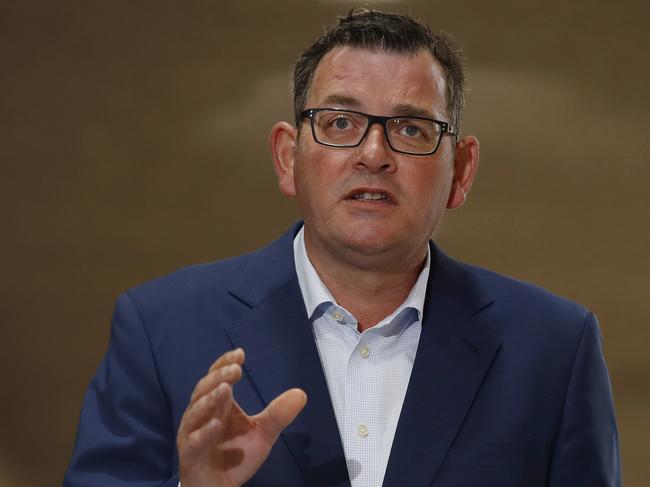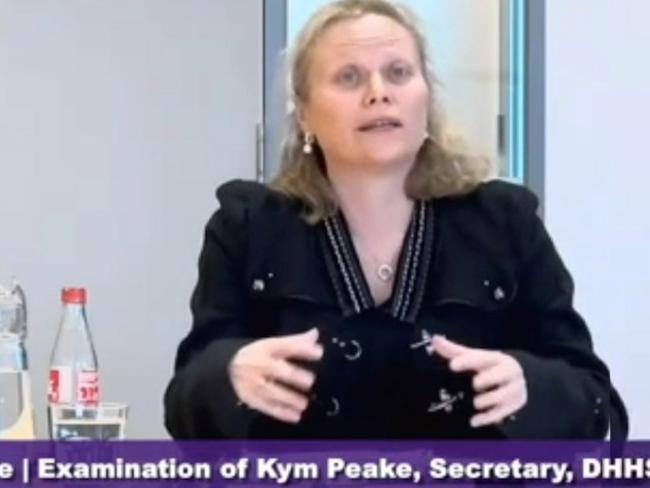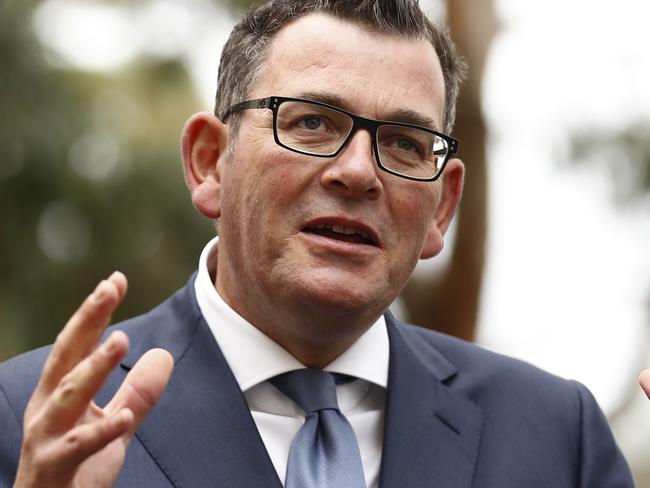Royal Commission makes 65 recommendations in bid to fix ‘broken’ Victorian mental health system
A damning report has torn apart failings inside Victoria’s mental health system, and officials have recommended multiple drastic changes to fix the crisis.
The state’s mental health system has “failed Victorians for decades” and is “woefully unprepared for current and future challenges”, the final Royal Commission report into Victoria’s mental health framework has found.
The five-volume and 3000 page document released on Tuesday recommended an urgent overhaul of the mental health system after two years of investigation.
Royal Commission chair Penny Armytage said the inquiry started its work in February 2019 because the mental health system was clearly failing Victorians.
“The system had indeed failed and had been failing for decades,” she told a special parliamentary sitting at Melbourne’s Royal Exhibition Building on Tuesday morning.
“Personally I was shocked by what I heard and saw. The mental health system had catastrophically failed to live up to expectations and is woefully unprepared for current and future challenges.
“The 2019-20 severe bushfire season and the COVID-19 pandemic shone a further light on the system.”

KEY FINDINGS
“Demand has overtaken capacity”: The Royal Commission found the system was “overwhelmed” and “could not keep up with the number of people who seek treatment, care and support”. This was evident at all levels, from individual mental health professionals to acute and emergency services, the report stated.
“Over-reliance on medication”: Mental health services have come to rely on medication as the main, or sometimes only, treatment people can receive. This is due to major system-wide challenges, such as under-resourcing, the report states. “This has led to an imbalance, with a lack of focus on therapeutic interventions and recovery-centred treatment, care and support”.
“Getting help is difficult”: People cannot access suitable services, and those who do access the system find it “hard to navigate”. People living with mental illness or psychological distress wait long periods and become “sicker” before they can gain access to services. The Royal Commission also found that increasingly, a person must exhibit signs of major distress or crisis before treatment, care and support are provided.
“Access to services is not equitable”: Poverty and disadvantage make it particularly difficult for people to access services, the report states. A disproportionate number of people living with mental illness have low incomes and no private health insurance. The Royal Commission also found the location where people live dictates how difficult it is to gain access to services, with this situation worse for people in rural and regional areas.
“The system is driven by crisis”: Limited service availability means many people living with mental illness or experiencing psychological distress only receive treatment, care and support at times of crisis, the report states.
“Investment in the system is inadequate”: Victoria’s monetary investment in mental health has been low compared with many other parts of Australia. Investment in mental health per capita is also poor compared with physical health.
“The workforce is under-resourced”: There are serious shortages in mental health staff, particularly in rural and regional areas. Despite the commitment and competence displayed by workers, many have struggled to perform their best in a crisis-driven system. Teams feel overworked and under-resourced.

KEY RECOMMENDATIONS
- All triple-0 calls concerning mental health crisis to be diverted to Ambulance Victoria rather than Victoria Police.
- Establish a promotion officer and promotion adviser to help promote the importance of mental health in Victoria.
- Ensuring people can access mental health services through a referral from a general practitioner or any other service provider in metropolitan and regional areas.
- Recognise people who are living with mental illness as a priority population group and during the next decade, allocate people living with mental illness a substantial proportion of social and affordable housing.
- Invest in a further 500 new medium-term (up to two years) supported housing places for young people aged between 18 to 25 who are living with mental illness and experiencing homelessness.
- Act immediately to reduce the use of seclusion and restraint in mental health and wellbeing services, with the aim to eliminate the practices within 10 years.
- Collaborate with funded non-government helpline services to improve helplines’ connections with mental health and wellbeing services.
- Invest in diverse and innovative ‘safe spaces’ and crisis respite facilities.
- Ensure that mental health clinical assistance is available to ambulance and police via a 24-hours-a-day telehealth service for officers responding to mental health crises.
- Deliver a broad range of bed-based services, including as a matter of immediate priority expanding hospital services which are delivered at home.
- Ensure that all new mental health inpatient facilities are built with gender-based separation in all bedrooms and bathrooms, as well as separate communal spaces.
- Ensure public health services and public hospitals receive adequate temporary funding to deliver in-hospital mental health services
- Fund initiatives, including anti-stigma and anti-bullying programs, across Victorian schools.
- Establish an infant, child and youth mental health and wellbeing system to provide care for newborns to 25-year-olds
- By the end of 2022, establish a Statewide Trauma Service to deliver the best possible mental health and wellbeing outcomes for people of all ages with lived experience of trauma.
- Establish a Suicide Prevention and Response Office which reports to the Chief Officer for Mental Health and Wellbeing.
- Establish a new statewide specialist service to undertake dedicated research into mental illness and substance use or addiction.
- As a matter of priority, increase the number of addiction specialists in Victoria.
- Establish a program for people in prison living with mental illness to help their transition upon release.
- Repeal the Mental Health Act 2014 (Vic) and enact a new Mental Health and Wellbeing Act, preferably by the end of 2021 and no later than mid-2022.
- Commission an independent review of Victoria’s mental health laws five to seven years after the enactment of the new Mental Health and Wellbeing Act.
- Work with the Commonwealth Government and the national cabinet Reform.

COVID-19: A LONGER-LASTING IMPACT
The coronavirus pandemic – which overlapped the 2019-20 bushfire season – has had “longer-lasting impacts on us (Victoria) than on other parts of the country”, the Commission found.
These “large scale disruptions” changed the course of the Commission’s direction, finding the state’s mental health season crippled under the pressure during this time.
The then Health and Wellbeing deputy secretary Terry Symonds summarised the impact of these events on Victorians to the Commission.
“I think it is appropriate to acknowledge … how difficult 2020 has been for the Victorian community. The pandemic, which overlapped with the devastating bushfires over the 2019–2020 summer, has had longer‑lasting impacts on us than on other parts of the country,” he said.
“The toll this is taking on our collective mental health cannot be underestimated.”
There were more than 300 mental health – related presentations to emergency departments, among people aged 0–17 years, in Victoria every week during strict lockdown in late November last year – at least 100 less than the same time in 2017.
A NEW APPROACH TO MENTAL HEALTH IN VICTORIA
- Two aligned service systems to be established — one for infants, children and young people up to their 26th birthday, and the other for adults and older adults.
- Mental health and wellbeing services to consist of six levels spanning from informal supports through to the most intensive statewide services.
- 50–60 new adult and older adult local mental health and wellbeing services, and dedicated local services for infants, children and young people.
- Treatment, care and support of people with high-intensity needs should be provided through 22 adult and older adult area mental health and wellbeing services and 13 infant, child and youth area mental health services.
- Each adult and older adult service would be co-ordinated with a 24/7 telephone or telehealth service for people in a mental health crisis.
- The services would be organised around eight regions overseen by regional mental health and wellbeing boards.
- A new agency would also be established, led by people with lived experience of mental illness or psychological distress.
- A new independent and statutory mental health and wellbeing commission would be established to hold the Victorian Government to account for the performance and the implementation of all the Commission’s 65 recommendations.

‘WE’RE ALL PAYING THE COST’
Addressing the media following the release of the report Victorian Premier Daniel Andrews said it would take “years” to fix the broken system, and a significant amount of money.
Mr Andrews said the report’s recommendations would be addressed in future budgets and needed support from the Federal Government.
“This is a profound investment in a system that will be there when you need it,” he said on Tuesday afternoon.
“We’re all paying the cost of failure now, and it is billions of dollars more than any levy.
“Doing this properly actually saves money, and it saves lives.”



To join the conversation, please log in. Don't have an account? Register
Join the conversation, you are commenting as Logout